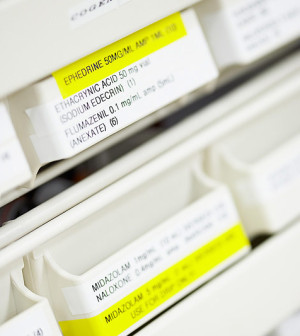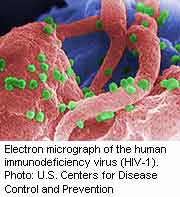- Could Your Grocery Store Meat Be Causing Recurring UTIs?
- Are You Making This Expensive Thermostat Error This Winter?
- Recognizing the Signs of Hypothyroidism
- 10 Strategies to Overcome Insomnia
- Could Artificial Sweeteners Be Aging the Brain Faster?
- Techniques for Soothing Your Nervous System
- Does the Water in Your House Smell Funny? Here’s Why
- Can a Daily Dose of Apple Cider Vinegar Actually Aid Weight Loss?
- 6 Health Beverages That Can Actually Spike Your Blood Sugar
- Treatment Options for Social Anxiety Disorder
Mississippi Girl Thought Cured of HIV Shows Signs of Infection


A Mississippi girl born with HIV who was thought to be cured by immediate and aggressive drug treatment has relapsed, with new tests showing detectable levels of the AIDS-causing virus in her bloodstream, disappointed federal officials announced Thursday afternoon.
The girl, now nearly 4 years old, had remained virus-free even though she stopped taking HIV medications when she was 18 months old. Doctors had hoped her remission would open the door to a functional cure for all children born with the virus.
But a blood test taken during a routine clinical care visit earlier this month uncovered detectable HIV levels in her blood. Additional testing found that the girl also had a decreased white blood cell count and the presence of HIV antibodies, both of which are signs that an actively replicating pool of HIV has established itself in her body.
“Certainly, this is a disappointing turn of events for this young child, the medical staff involved in the child’s care, and the HIV/AIDS research community,” said Dr. Anthony Fauci, director of the U.S. National Institute of Allergy and Infectious Diseases. “Scientifically, this development reminds us that we still have much more to learn about the intricacies of HIV infection and where the virus hides in the body.”
Genetic tests determined that the child’s HIV infection is the same strain acquired from her mother.
Doctors have placed the girl back on antiretroviral therapy, which has successfully decreased her viral levels with no side effects.
Researchers had believed that early treatment with a panel of antiretroviral drugs had prevented HIV from gaining a foothold in the girl’s immune system. It appeared that the virus had been unable to create a reservoir in her body in which dormant HIV could hide and later reignite when she stopped taking medication.
“The fact that this child was able to remain off antiretroviral treatment for two years and maintain quiescent virus for that length of time is unprecedented,” said Dr. Deborah Persaud, a professor of infectious diseases at the John Hopkins Children’s Center in Baltimore and one of the two pediatric HIV experts involved in the ongoing analysis of the case. “Typically, when treatment is stopped, HIV levels rebound within weeks, not years.”
Fauci said Thursday that this early treatment “did not completely eliminate the reservoir of HIV-infected cells that was established upon infection, but may have considerably limited its development and averted the need for antiretroviral medication over a considerable period.”
“Now we must direct our attention to understanding why that is and determining whether the period of sustained remission in the absence of therapy can be prolonged even further,” he concluded.
The girl’s pediatrician, Dr. Hannah Gay, of the University of Mississippi Medical Center, launched HIV treatment just 30 hours following the girl’s birth.
Doctors normally put HIV-positive mothers on two antiretroviral medications prior to birth as a way of preventing transmission of the virus to their unborn children. After delivery, doctors test the newborns for HIV and continue treatment if the virus appears.
But in this girl’s case, no one knew the mother was HIV-positive before delivery. This prompted Gay to put the newborn on antiretroviral treatment immediately, and that timing appears to have made a difference.
Gay also chose to employ a combination of three antiretroviral drugs, all at doses commonly used to treat HIV-infected infants, and kept the girl on the medications until she was 18 months old. This prevented the virus from mounting any drug resistance.
Tests showed progressively diminishing HIV levels in the infant’s blood, until it reached undetectable levels 29 days after birth. The child remained on antiretrovirals until 18 months of age, at which point doctors said they lost track of her and she stopped treatment.
Doctors next saw her about 10 months after her treatment ceased. The child underwent repeated standard HIV tests, which detected no virus in her blood.
More information
For more on children and HIV, visit the U.S. Department of Health and Human Services.
Source: HealthDay
Copyright © 2026 HealthDay. All rights reserved.










